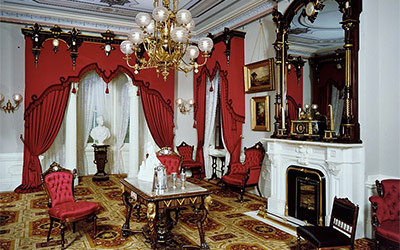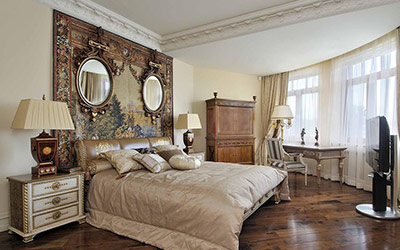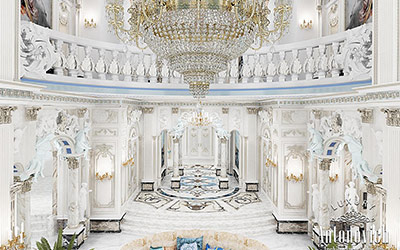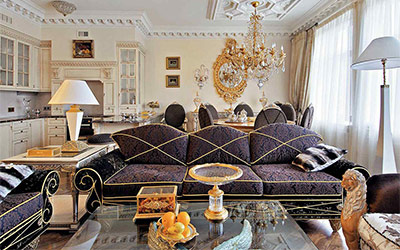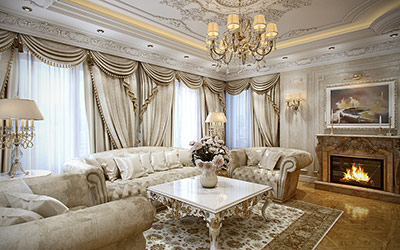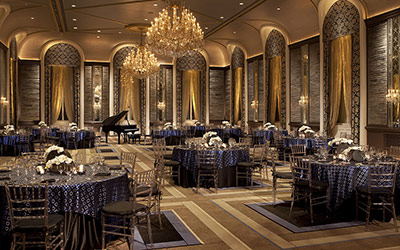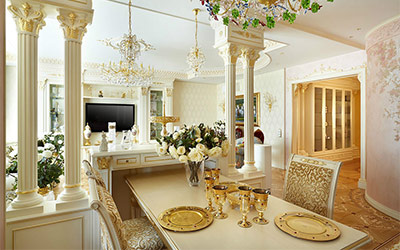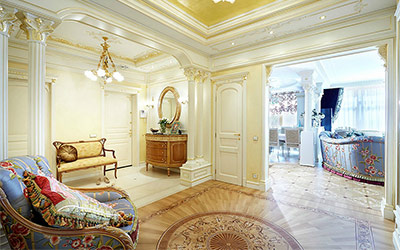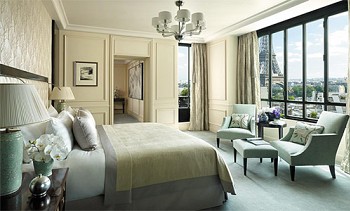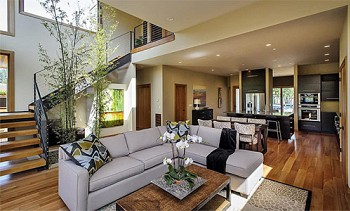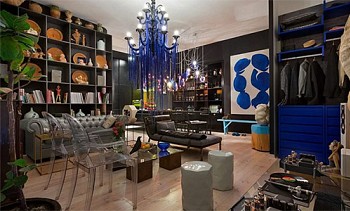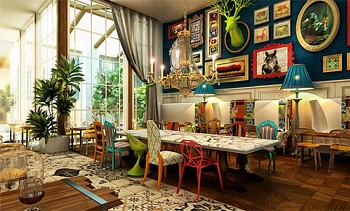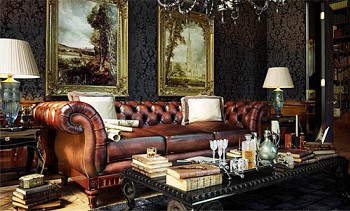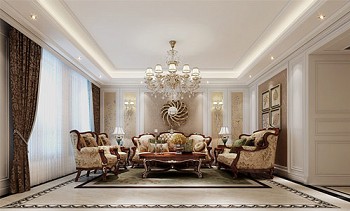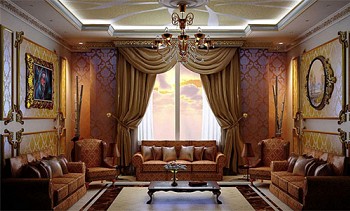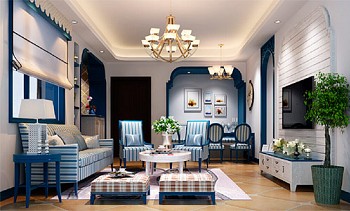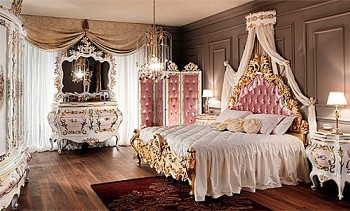Empire in the interior of historical and modern rooms
Empire style in the interior appeared during the reign of Emperor Napoleon. His main task was to represent the authorities, emphasizing status and unlimited possibilities. Another name for the style is imperial or palace. Indeed, according to the canons of the empire, the interiors of the palaces of the French and Russian emperors are built. They are majestic and monumental, official parade and severity is inherent in them.
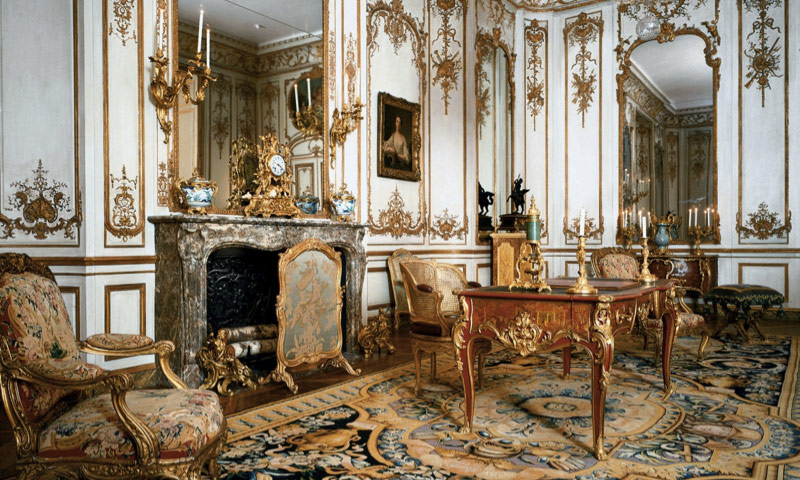
Content:
Style story
Empire - this is how the name of the style is translated from French. Creating his empire, Bonaparte sought to unite vast territories and different peoples under his leadership. The link was to become common cultural traditions. However, the severity of classicism, prevailing in European capitals at the end of the XVIII century, was not suitable for this purpose.
Therefore, in the first decades of the 19th century, a new style took shape in architecture, painting, literature and, of course, interior interiors. The French painter, exalting on his canvases the emperor and his retinue, Jacques Louis David, worked on the creation of the empire. He praises the military exploits of the ruler, portraying him riding a hot horse. In addition, he makes beautiful lacquered furniture, decorated with expensive mosaics and ornaments, and presents Josephine. This approach was very generously appreciated by the authorities. David begins to make large orders, he becomes famous.
Under the influence of monumental paintings by Jacques Louis, architecture is also developing. Grand rulers are being rebuilt for the ruler, delighting with their beauty and pomp. The names of the architects Pierre Fontaine and Charles Persier, who renewed the Tuileries and the Louvre, become famous. According to their sketches, famous furniture sets in the Empire style were made.
Interior design in the Empire style penetrated into Russia. The influence of French culture was great at the beginning of the 19th century. Famous persons invited French tutors, painters, architects. It was fashionable not only to dress in the French manner, but also to express your thoughts with the help of a foreign language. For the construction of palace complexes and cathedrals, Henri de Montferrand, Carl Rossi were invited to Russia. In their performance, the empire sounded softer and more plastic.

The interior of the Pavlovsk Palace.
Features of the French Empire
The French Empire in the interior extols Napoleon, so he is characterized by ostentatious parade and grandeur. The origins of the style go back to Ancient Rome with its attraction to grandeur and symmetry. Many interiors are decorated with columns, antique sculptures, and stucco molding. For surface finishing use natural wood, mirrors, bronze. The walls are decorated with paintings and portraits in massive frames. The ceilings look like works of art. They are complemented by carving, stucco molding, gilding. Their main decoration are magnificent chandeliers with crystal suspensions. Furniture in Empire style looks thoroughly and effectively. Her appearance is influenced by the events of a military campaign in Egypt and a fascination with Roman traditions. Chairs with straight backs are decorated with pads with lion heads, their legs are in the shape of lion paws or Roman columns. For the manufacture of furniture using valuable wood, natural marble or porphyry.
French Empire is the style of the halls for official receptions and special occasions. It is designed to delight and enchant, to conquer at first sight. Empire is more suitable for the design of classrooms, ceremonial halls, large dining rooms and living rooms. Less commonly, bedrooms are decorated with it.
Features of the Russian Empire
Fashion for everything French appeared even under Emperor Paul. However, it was strictly forbidden to import furniture purchased in France into Russia. This ban was preserved under Alexander I. However, during his reign, Russia began to manufacture furniture in the Empire style. For Alexander I from France, albums with sketches of the best architectural buildings, interiors, furniture are transferred. Furniture is ordered to the best craftsmen who make it from mahogany and Karelian birch, decorate it with mosaics and carvings. However, it turns out not so heavy and straightforward.
Furniture made for the capital is most similar to the French original. Orders for the province (Moscow landowners) have soft forms, they are not so elegant and official, they have a more homely appearance. So the "Russian Empire" is divided into two types - the capital and the provincial. For the palace interiors of St. Petersburg, they ordered mahogany furniture or rosewood with gilded overlays and magnificent mosaics. Silk or velvet was used for upholstery. For Moscow interiors, furniture was made from wood of simpler species - ash, walnut, linden. Chintz was selected as upholstery.
Empire style key features
1. Large area and grandeur - the main feature of the style. Empire is a historical style that denotes the interiors of palaces and residences of emperors. It gives the premises a majestic and solemn appearance. Today he is chosen for registration of status rooms in hotels of the highest class, interiors of country houses and villas, banquet rooms in restaurants.
2. Using a centric composition. The principles of surface finishing and arranging furniture in a large room are most often built on a radial or centric composition. As a rule, the center of the floor and ceiling is emphasized by a pattern.
3. Antiquities and military glory for interior decoration. Sculptural groups, porcelain vases, bronze candlesticks are placed around the perimeter of the hall for gala receptions or the grand living room.
4. Large mirrors. I use them to emphasize the brilliance of golden surfaces and reflect the splendor of the decor. The mirror must necessarily be large, decorated in a massive frame.
The role of color in creating the interior
For interior design in the Empire style, the main color is gold. It is he who is called to emphasize the power and status of the palace setting.
The brilliance of gold is perfectly emphasized by:
1. White color, creating the impression of sophistication and elegance. This combination is typical for decorating ceilings and walls.
2. Red, wine red, emphasizing strength and dignity. It is most often used for textile decoration (red carpets, upholstery of sofas and chairs, curtains).
3. Noble blue, radiating cold energy, was used to design living rooms or boudoirs. In the Empire, it is less significant in status than red. Accordingly, it was used for decoration of less important rooms.
Wall decoration
The walls in the Empire style are not just an inconspicuous background for paintings and mirrors, this is a precious cut. They were decorated, like all surfaces, with stucco molding, with gold patterns. For wall decoration do not use wallpaper, rough masonry or plastic panels. These materials are prohibited.
To design a modern room in the Napoleonic spirit, you can use the following methods:
- paint the walls with matte white or light beige paint;
- visually divide them into symmetrical parts using overhead columns, moldings and stucco decorative elements;
- emphasize all volumetric decorative elements with gold paint;
- close some narrow piers with mirrored panels;
- hang mirrors in large frames in several places;
- to decorate the walls with family portraits in majestic poses and dresses of the beginning of the XIX century.
Ceiling
The imperial style room has high ceilings. This is an important condition that you should pay attention to when creating a design of a modern interior in the Empire style.If a country villa has two floors, and the rooms have high ceilings, then they can be stolen royally. For a small apartment with low ceilings, such techniques will not work.
So, the main features of the ceiling are expressed in the following:
- they have a straight or domed shape;
- painted white without gloss;
- decorated with antique-style paintings, gold stucco molding, medallions;
- the larger the area of the ceiling, the more chandeliers on long suspensions illuminate it.
Floor
Empire style in the interior is repeatedly emphasized by the beauty and originality of patterns on the floors. To finish the floor used natural wood of various species. Most often, the floor was laid out with a parquet board in an artistic way. To create a picture, a parquet board made of light and dark wood was used. The pattern is necessarily symmetrical, often starts not from the corner, but from the cent.
The floors in the living room and bedroom are decorated with expensive handmade carpet. As a rule, he has an ornamental pattern in blue-gold, red-gold or white-gold.
Empire style furniture
Empire-style furniture gravitates to official parade. Small forms, female sophistication and ornateness are alien to her.
The main features of furniture sets are as follows:
- The use of natural expensive materials for the hull and upholstery. Smooth lines outlining the shape.
- Furniture for the room is selected from a tree of the same species.
- The surface adorned with the ornament, while the basis of the ornament are flowers and geometric shapes, often with a gold coating.
- Copying furniture items from Ancient Rome and Greece. A vivid example is the Roman bed, on the one side of which there is a headboard, and on the other, an armrest.
Typical furniture items:
1. Low round table on one support. It was made of valuable wood, decorated with inlay, carvings and gold ornaments.
2. Showcase with distinctive finishes and glass shelves. With decoration of bronze overhead parts, sculptural details.
3. Large dining ceremonial table surrounded by tall chairs. For the dining group, a complex technique of decorating surfaces was often used - merketri (a mosaic using valuable species), art carving.
4. Exclusive mosaic decorated musical instruments.
Decor
During the reign of Bonaparte, interiors were decorated with bronze groups: candlesticks, chandeliers, sculptures and watches. They were distinguished by the special quality of coinage, the alternation of matte and glossy surfaces, symmetries and harmony of appearance. A special place in the interior in the Empire style was occupied by china, portraits and mirrors in voluminous gilded frames.






















